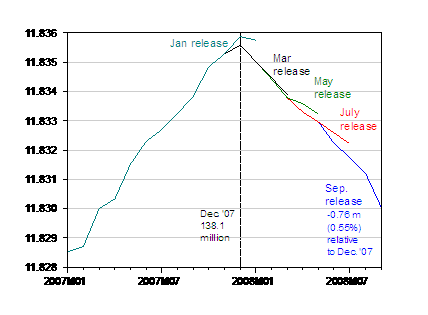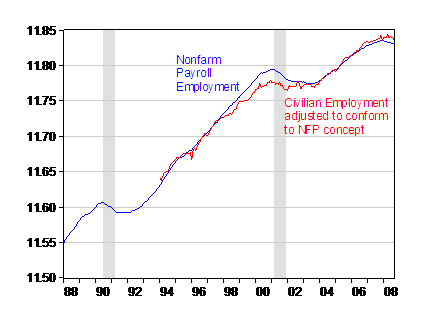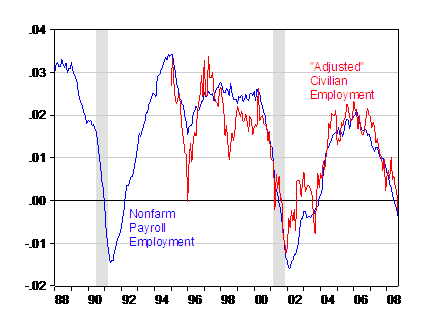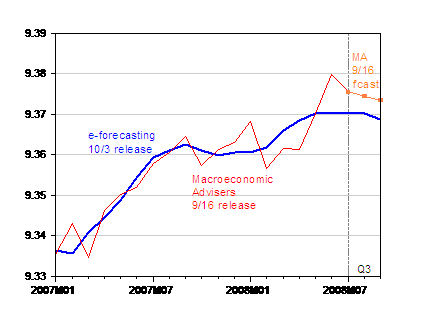I hate to pile on, perhaps in a repetitive fashion given Jim’s post, but a mere three weeks ago, Donald Luskin was asserting “Things today just aren’t that bad.” And, pulling a comment out from mid-September, we have this definitive statement: “But in the final analysis let’s just stick to facts. We are not in a recession.”
I’m not saying I know we are in a recession — the NBER BCDC decides that [0], [1]; but I think the case is getting pretty strong. The consensus was for a decline of 100,000 jobs. The actual was 159,000 jobs. Figure 1 shows the September release data, as well as releases for every other month going back to the January 2008 release.

Figure 1: Nonfarm Payroll employment, seasonally adjusted, various releases. Source: BLS, employment situation, various releases.
Notice that whenever the numbers are revised, they are revised downward. Moreover, the September figures manifest an acceleration in negative net job creation (since the figures are plotted in log terms). Relative to December 2007, nonfarm payroll employment is down by 0.76 million, or 0.55% in log terms.
How do these figures compare to those surrounding previous recessions. Keeping in mind that I am using final revised figures, Figure 2 shows the nonfarm payroll series and the civilian employment series (based on the household survey) adjusted to conform to the NFP concept that I have reported in previous posts [2] [3], extending back to encompass the last two recessions. The “adjusted” series is not revised on a monthly basis.

Figure 2: Log nonfarm payroll employment (blue) and log civilian employment adjusted to conform to NFP concept (red). NBER defined recessions shaded gray. Sources: BLS via FRED II, and BLS, and NBER.
Since it is difficult to see exactly the rate of employment decrease, I plot the twelve month percentage change (in log terms) in Figure 3 for both series. The blue line is the same as the series plotted in the 4th graph in Jim’s post.

Figure 3: 12 month log-change in Nonfarm payroll employment (blue) and in civilian employment adjusted to conform to NFP concept (red). NBER defined recessions shaded gray. Sources: BLS via FRED II, and BLS, and NBER.
What this graph makes clear is that — not only are both series’ growth rates negative — they are both at levels that are consistent with recession.
Here’s the latest monthly figures I have.

Figure 4: Estimated log GDP from e-forecasting (blue), and from Macroeconomic Advisers (Ch.2000$). Dashed line at beginning of Q3. Source: e-forecasting 10/3 release and Macroeconomic Advisers [xls] 9/16 release.
The figure plots the e-forecasting series released last Friday, and the Macroeconomic Advisers series released about three weeks ago. Deutsche Bank’s forecast released 10/3 is for -0.5% growth (q/q annualized) in 2008Q3, and -2.0% in 2008Q4.
Now, it’s true I haven’t discussed the other variables the NBER BCDC looks at: industrial production, manufacturing and trade sales, and income less transfers; but these are still on their negative trajectory, and (in the latter two cases) less timely.
Hence, I think it safe to say that there is a good chance we are in a recession.
Technorati Tags: recession, nonfarm payroll employment,
revisions, civilian employment,
and GDP.
Menzie – I’m certain that 99.9% of America thinks that we’re in a recession… Are you and JH issuing frequent posts with poor economic results as a means of kicking the NBER out of their tarpor?
The problem of such an approach consists in an assumption that labor force in uniform and some decrease in the absolute number of employed people is directly mapped into real GDP. This is wrong assumption and contradicts observations in the USA. For example, in
The driving force of labor force participation rate in developed countries (http://papers.ssrn.com/sol3/papers.cfm?abstract_id=1130147)
Productivity growth related to the decrease in labor force compeletely compensates negative influence of the smaller number of employees.
ashoenenberger: You might be right that 99.9% of the US thinks the economy is in recession, but apparently the remaining 0.01% are Econbrowser readers. Hence, I won’t be surprised if somebody writes in something of this vein (as one did in mid-September, only three weeks ago): “Consequently, I do not believe we are headed for a recession although major sectors of the economy are experiencing severe difficulties. My crystal ball warns me that this is my best guess and I may be wrong. You makes your bets and takes your chances.”
With everything that’s happened in the last two weeks, you’re going to hold someone to what they said three weeks ago?
Much like those revised statistics, economic indicators are getting worse as time moves forward. But that is not going to be a trend forever.
Why would anybody sentient pay the first iota of notice to Luskin?
Professor, will President Obama cure all our economic ills in one quarter or two?
@ jg
If there is a logical fallacy called leapinvisiblefrogging, you just committed it.
Currently Bush is Hoover and Obama is Roosevelt. Bush is trying to hold up home prices with more liquidity. Obama will likely legislate it.
We are currently not in a recession but the recent bailout and associated government spending amounting to approximately $2 trillion dollars will pull resources and capital out of the productive economy and dump them into the black hole of an already over built and over extended credit and real property market.
You guys seem obsessed with pushing the point that we’re in a recession. OK. I accept your point. So what?
Ostrich, perhaps we addressed some of what you’re wondering in a post last June, titled Is this a recession and should we care?
What we offer here is “analysis of current economic conditions and policy.”
At some point we’ll turn to discussing when the recession is over. In the mean time, expect us to be obsessing, among other things, how bad it’s going to be.
JDH wrote:
At some point we’ll turn to discussing when the recession is over.
Professor,
I sure hope you are right. It this lasts as long and is as deep as the GD some of us will be dead before we start discussing when it will be over.
“Notice that whenever the numbers are revised, they are revised downward.”
The monthly revisions are the result of late-reporting employers. That’s all. Unless you have a theory about who reports late, a few data points are not meaningful.
The more important revisions are the annual benchmarking. James has reviewed this and the birth/death adjustment controversy in the past. The preliminary estimates were just announced. As I noted (http://oldprof.typepad.com/a_dash_of_insight/2008/10/critics-of-the-bls-birthdeath-adjustment-proven-wrong.html) the result proved the birth/death critics to be wrong.
To summarize, there is no specific pattern to revisions, as much as people might try to infer one.
Jeff: I’ve not been a critic of the birth/death model in the past, and am not trying to be one here. Rather, what I was pointing out was (given the trend-following attributes of the standard statistical procedures), more often than not the revisions (not the benchmark ones, but the month by month) were upward as employment was growing. This pattern persisted until about 2007M03, until which time it became ever more likely that a revision would be downward. And now that employment is declining, the revisions seem consistently downward. That’s all I was highlighting.
And to be fair, this pattern of downward revision of employment in particular, has been widely noted by Goldman Sachs, JP Morgan etc. amongst others in their briefings. It does appear to be a clear sign of recession.
Menzie – -I’m sorry to get two revisions in the same comment, which was apparently not clear. I know that you have not been a b/d critic, since I read all of your work. I was just trying to point out that the benchmark revisions were much more important and open to question than the monthlies.
Turning to those, and bill j please help me also, I know that there are many who think that they see patterns. Most do not seem to have studied the BLS methodology. They put out a report based upon 65% of the returns, another reflecting the next batch, and the final revision, which still is missing the last 10-15%.
Any theory of a pattern in revisions must include an explanation of why the late-reporting firms are different from early reporters. If it does not do that, the rationale does not wash.
I can construct a couple of ideas along that line, but we can all imagine explanations after seeing a few data points.
OK, I think I get your point. I’ve kind of been wondering whether we’d get past the home building bust and the oil price shock before the consumer went into the tank and started saving. I’d say the August and September data say, nah, we didn’t make it. Presumably the terror in the financial markets have given the final push. So now the question is, how far does the feedback loop wind the economy down? That’s your point, right?
Too bad we aren’t in a recession. Then, focusing on when whether we’re out of recession might help make things better.
Jeff: Point well taken. I agree completely that the benchmark revisions are quantitatively much more significant. But I also find the serial correlation in revisions interesting.
aaron: I don’t understand your comment. What’s your definition of recession, or has the NBER BCDC told you something we’re not privy to?
Just pointing out that if we were technically in a recession, we’d be focused on making things better rather than trying to figure out how bad things are.
Menzie,
Don made these statements almost a month ago. Since then we have about $2 trillion in government bailouts to various entities. I don’t know where Don is now in his thoughts, but with the moves of congress taking resources from the productive economy and pouring it into the frozen economy, I would say that recession is inevitable.
Menzie,
If it is any consolation Don is off his rocker. I just heard him support both the bailout and the ban on shortselling. Another free marketer down the toilet.
He has been moving toward the Dark Side for a few years. When I have called him on it he simply says, “Now Dick you know me. I didn’t mean that.” Well Don if you don’t mean it don’t say it.